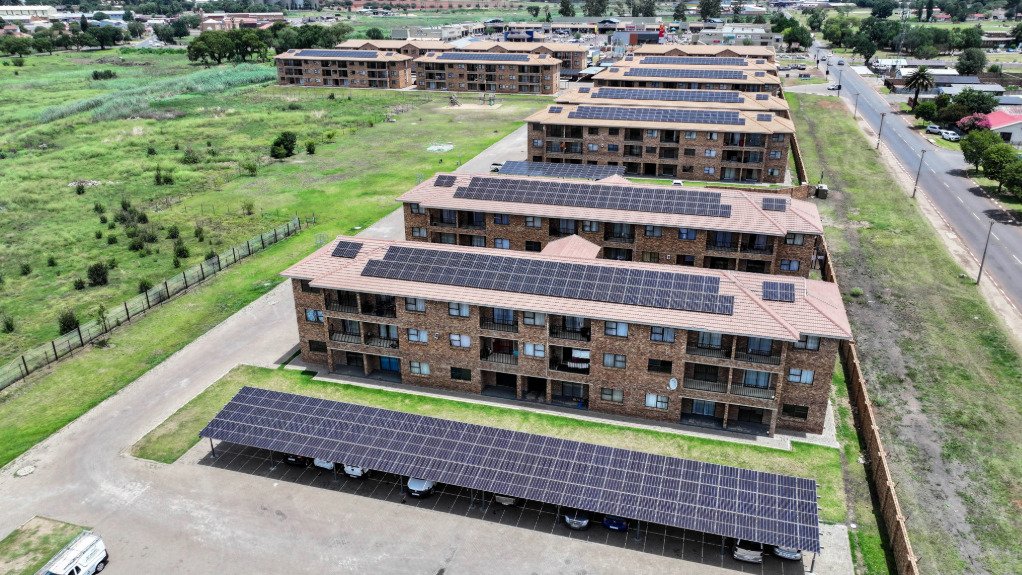Hybrid energy solutions boost power reliability


TRANSITIONING FROM DIESEL The advancements in renewable-energy technology and energy storage have made these alternatives more cost-effective and reliable, further accelerating the transition away from diesel generators
Photo by Blockpower
Despite reduced loadshedding, power reliability concerns in South Africa persist. Consequently, solar solutions company Blockpower seeks to address the need for reliable, sustainable power through its hybrid solutions, incorporating solar and advanced battery storage, among other sources.
“The demand for standby power solutions, such as generators and battery storage, has significantly increased in recent years owing to ongoing power shortages and loadshedding in South Africa,” explains Blockpower project head Martin van Zyl.
He elaborates, noting that businesses and households are increasingly investing in traditional generators combined with renewable options, such as solar power and battery storage, driven by their need for reliable, uninterrupted supply.
This shift is further influenced by falling costs, greater awareness and a growing preference for sustainable energy solutions.
One of the innovations incorporated by Blockpower is Internet of Things- (IoT-) enabled monitoring, which improves management for residential estates by providing real-time data on energy usage, thereby enabling more efficient control and optimising power consumption.
The IoT systems can track energy-use patterns, detect inefficiencies and provide insights into how energy is being consumed across any residential estate that has such a system, through connected devices and sensors.
This data allows for proactive adjustments that reduce waste, lower costs and improve overall efficiency. Additionally, IoT systems can alert residents or residential estate managers about any issues, such as equipment malfunctions or excessive consumption, enabling quick remedial action.
“By automating and optimising energy use, IoT enhances sustainability and helps manage energy resources more effectively,” notes Van Zyl.
Moreover, he explains that the technology can automatically adjust the use of appliances and devices, prioritising critical loads while reducing or shifting non-essential consumption.
It is also able to integrate with energy systems, such as batteries, to draw from stored energy during peak hours, easing pressure on the grid. This dynamic and automated control helps prevent overloading, ensuring a more stable and efficient energy distribution during high-demand periods.
Residential estates can expect cost savings from IoT-enabled energy management systems through reduced energy consumption, shifting usage to off-peak hours for lower rates, and extended equipment life owing to reduced wear and tear, all of which ultimately lead to lower electricity bills and maintenance costs.
Shift from Diesel
Diesel generators contribute to air pollution and greenhouse-gas emissions, while cleaner alternatives such as solar power, battery storage and hybrid systems offer lower emissions, reduced fuel costs and long-term sustainability.
Van Zyl points out that there is a “noticeable shift in preference from diesel generators to cleaner alternatives, driven by factors such as increasing environmental awareness and government regulations”.
Additionally, advancements in renewable- energy technology and energy storage have made these alternatives more cost-effective and reliable, further accelerating the transition away from diesel generators.
“Battery storage reduces reliance on generators by storing excess energy, either from renewable sources, such as solar panels, or from the grid, for use during peak demand or power outages,” states Van Zyl.
This lowers long-term costs for homeowners by reducing the need for costly fuel-powered generators and allows them to take advantage of off-peak energy rates.
Further, it enhances energy independence, decreases carbon footprints and increases resilience to power disruptions.
BESS
Van Zyl notes that a battery energy storage system (BESS) can be considered more advantageous than generators in many scenarios, owing to their environment-friendly nature.
He adds that the systems’ lower maintenance needs, quieter operation and higher efficiency make them ideal for long-term use, especially in off-grid or renewable-energy applications.
“A BESS typically has a longer lifespan and requires less maintenance compared with traditional diesel generators, which need regular upkeep, including oil changes and fuel system checks.”
A BESS meanwhile, requires minimal maintenance – primarily periodic checks on battery health and inverters.
Improvements in battery storage and smart grid technology are expected to significantly influence the standby power sector by enhancing efficiency, reliability and cost-effectiveness.
Looking ahead, the future of standby power solutions in South Africa will likely be shaped by the increasing adoption of renewable energy, advancements in energy storage technology and the integration of smart grid systems.
“Together, these advancements will make power systems more resilient, efficient and adaptable, leading to greater adoption of renewable energy and a decrease in the use of diesel generators,” Van Zyl concludes.
Article Enquiry
Email Article
Save Article
Feedback
To advertise email advertising@creamermedia.co.za or click here
Press Office
Announcements
What's On
Subscribe to improve your user experience...
Option 1 (equivalent of R125 a month):
Receive a weekly copy of Creamer Media's Engineering News & Mining Weekly magazine
(print copy for those in South Africa and e-magazine for those outside of South Africa)
Receive daily email newsletters
Access to full search results
Access archive of magazine back copies
Access to Projects in Progress
Access to ONE Research Report of your choice in PDF format
Option 2 (equivalent of R375 a month):
All benefits from Option 1
PLUS
Access to Creamer Media's Research Channel Africa for ALL Research Reports, in PDF format, on various industrial and mining sectors
including Electricity; Water; Energy Transition; Hydrogen; Roads, Rail and Ports; Coal; Gold; Platinum; Battery Metals; etc.
Already a subscriber?
Forgotten your password?
Receive weekly copy of Creamer Media's Engineering News & Mining Weekly magazine (print copy for those in South Africa and e-magazine for those outside of South Africa)
➕
Recieve daily email newsletters
➕
Access to full search results
➕
Access archive of magazine back copies
➕
Access to Projects in Progress
➕
Access to ONE Research Report of your choice in PDF format
RESEARCH CHANNEL AFRICA
R4500 (equivalent of R375 a month)
SUBSCRIBEAll benefits from Option 1
➕
Access to Creamer Media's Research Channel Africa for ALL Research Reports on various industrial and mining sectors, in PDF format, including on:
Electricity
➕
Water
➕
Energy Transition
➕
Hydrogen
➕
Roads, Rail and Ports
➕
Coal
➕
Gold
➕
Platinum
➕
Battery Metals
➕
etc.
Receive all benefits from Option 1 or Option 2 delivered to numerous people at your company
➕
Multiple User names and Passwords for simultaneous log-ins
➕
Intranet integration access to all in your organisation


















